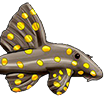Hi,
The Black and what I call "Bull Nose" BN"s.
those are (almost certainly) not genetic modifications.
I believe the more common term for that in English is snub nose and it is most widely believed to be the result of some kind of deficiency early on in the raising process.
It is kind of uncommon in Ancistrus, but happens frequently in, for example, Hypancistrus zebra. They also frequently pop up in Pseudacanthicus. Loricaria simillima is also very prone to produce a lot of snub noses.
There is a frequent debate going on about the reason for it, and the most commonly heard explanations are deficiency in some kind of essential vitamin (or some other nutrient) or, in the second "big camp", bacterial growth in the rearing container resulting from insufficient hygiene. In somewhat the same general camp are those that believe it is something in the water (such as certain phosphates) that causes this.
I am very careful in identifying the actual source, because I strongly believe that there is more than one potential cause for it (which would mean that it is the symptom of more than one "ailment"). I basically believe that they (the different explanations) may well all be right.
That being said, there were some German hobbyists that experimented with line breeding it (i.e., trying to find out if it is genetic) and found that it is most likely not genetic (i.e., snub nosed parents do not produce significantly more snub nosed offspring).
Cheers,
Sandor
"What gets us into trouble is not what we don´t know.
It´s what we know for sure that just ain´t so."
--Mark Twain








